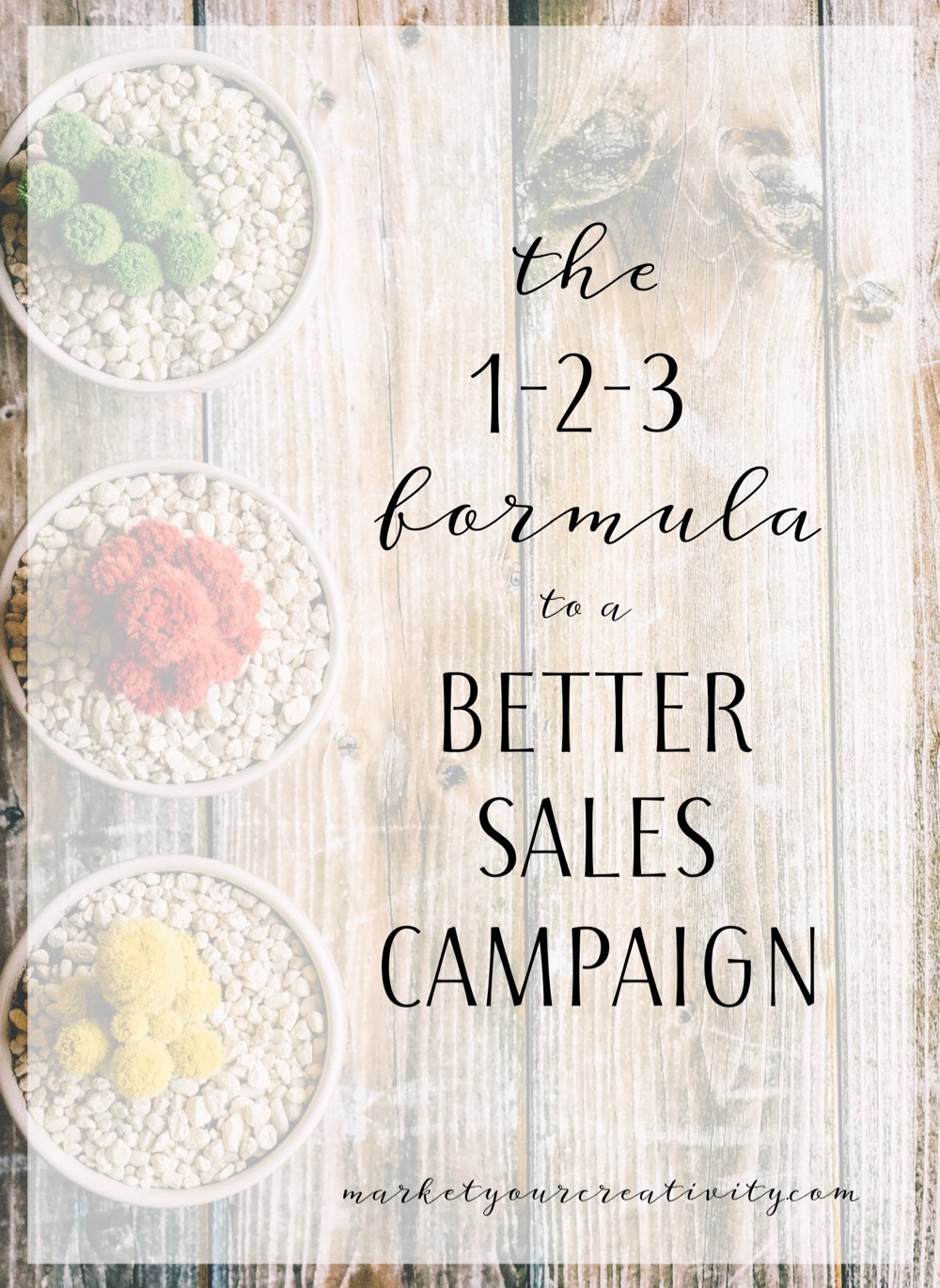This year, my private training and public blog posts are going to have a strong focus on how to sell—it’s an authentic art form that you can learn to master, and it’s the absolute KEY to your success online. In order to do so, I’m going to kick us off with some fundamentals using this 1-2-3 formula to a better sales campaign.
Before we begin, let’s start with a very important fact: You (the business owner) have very little part in the customer’s story and how they want the sale to unfold. To create a compelling sales campaign, you need to deeply understand your buyer and what they’re trying to achieve.
Many people come to me with the exact same problem: “Nobody’s buying my stuff.” And all I hear from that complaint is, “Me, me, me.”
- I’ve built a storefront, I want them to come to me
- I’ve made a product, I want them to buy from me
- I’m blogging, I want them to read me
- I’m sharing, I want them to engage with me
- I’m building an email list, I want them to sign up for more of me
WRONG! This is me-centric marketing. It’s an incredibly greedy approach, and anytime you find yourself frustrated and impatiently checking stats for recognition or sales, it’s probably because you’re coming from the “me” angle.
Instead, you should encompass every potential buyer with a story and presentation that’s specifically catered to them. You and what you want will have very little to do with the sales process, and if you want to start seeing more sales, there’s always more to uncover about what your customer really wants when they shop your market.

What’s Their Biggest Challenge?
I’m going to start this article assuming you already know who your ideal customer is; you’ve done the write-up exercise and you strive to enhance it over time. There’s as much to know about this person as there is to know about your spouse or best friend.
This is also an important step in getting you out of any me-centric marketing you might be doing. Me-centric marketing wastes time and costs sales. We can’t shift the focus to a customer-centric marketing plan unless you know exactly who you’re trying to understand better.
>>> If you haven’t yet identified your ideal customer, do this exercise first. <<<
After you’ve identified your ideal customer (again, none of this works without taking the time to do that exercise), here are the big marketing questions you need to ask:
- In regard to my product, what is my ideal customer’s biggest challenge? (i.e., better interior design, a personal statement, a better sense of style, a diet plan that works, etc.)
- What is she looking for when she’s shopping my product? (i.e., she wants to feel good in her skin, she wants empowerment, she wants custom wall decor, my bracelets help show off her personality, my scarves add that layered extra, etc.)
- What is her ultimate goal when she’s buying my product? (i.e., a thriving business, an educated diet plan, a decorated home, a great collection of accessories, the perfect outfit, etc.)
- What is she hoping to achieve after she’s made the purchase? (i.e., a plan she can trust, a skill she can build on, to feel her home’s “finished”, to know she always has the right accessory for every occasion, to feel her closet represents her, etc.)
When you know your ideal customer + deeply understand WHY that person is coming to you, you will approach in a way that makes her feel heard and understood. When a customer feels this, it’s as if you’re speaking directly to her and her needs.
I might be read by 50,000, but I’m speaking to YOU. Can you feel it?
When a customer feels heard and understood, it allows them to let their guard down. They think, You “get” me. It builds trust and loyalty. And trust me when I say, you cannot build a thriving online business without truly “getting” your customers.
1- Show Them You Understand Them
The best conversations in life are genuine, interesting, and interested. A good sales campaign will appeal to your customer because it’s genuinely interested in them and their challenges. Again, you and what you want will have very little to do with the process.
Do your customers feel understood? Or are you …
- doing a lot of talking and posting, but feel as though nobody is listening?
- churning out a lot of products, but nobody’s buying?
- reaching for customers every way you know how, but connecting with no one?
The general advice for marketing in business is to “write as if you’re talking to one person.” Right? I’ve heard that floating around, and I’m sure you have, too.
The problem with that advice is that it’s incredibly generic.
Imagine I issued you a coaching assignment in which you had to go out all day long and have sales conversations with everyone you encounter. You have to go shopping, grab a coffee, have lunch with an old friend, etc., but you have to be out all day and put yourself in front of a mix of new people.
If you’re anything like me, this wouldn’t be a comfortable assignment (I’m an introvert through and through), but it would be doable. I would think ahead on every situation and consider HOW I would approach them. At check-out, I might notice a store clerk’s jewelry, then offer her a free sample with my business card. I could cut straight to the point with an old friend. Approaching all of these people might not be comfortable for me, but I would work it out.
But what if I layered on that generic advice and told you that you had to speak “as if you’re talking to one person”, and you had to have the same exact sales conversation with everyone you encountered? I don’t know about you, but I’d quit the coaching assignment based on how that would make people feel.
You see, if you’re not addressing your customers in a very personal and targeted manner, you make everyone you encounter feel like prospects. And that’s never how you want people who hire or buy from you to feel.
The key to a solid sales campaign is putting the focus solely on the customer and their needs in a very specific way.
2- Have an End-Result in Mind
Your potential customers are impatient and selfish, as we all are! They only want the next viable solution, then the next one, and then the one after that.
People don’t want to buy a quarter-inch drill, they want a quarter-inch hole. – Thedore Levitt
In other words, stop trying to sell the quarter-inch drill (me-centric approach), and start marketing the quarter-inch hole (customer-centric approach)! Show your customers that you know what they really want, and then offer to deliver it.
They don’t care about “your” art, they’re searching for matching pieces to create a gallery wall for their home. They’re not looking to buy your course, they’re aching for a solution to their problem with simple instructions for achieving it. They don’t want to buy another t-shirt, they want an outfit that expresses their style.
It’s your job to embed your product smack dab into their realm of desires by staging it there.
3- Learn How to Communicate Your Value
For online businesses communication is copywriting, and this is where we’ll start the upcoming series on sales; it’s a fundamental component to your success.
While there is such a thing as professional copywriters, everyone should learn how to be their own copywriter first. No one else knows the product or service like you do. At bare minimum, you must learn how to sell your brand, pitch your product, and write an email campaign that converts. Copywriting is simply a marketing language to be learned.
Right now as we speak, there is a sea of interested people waiting for the solution you have to offer. They’re looking to pick up what you’re laying down. They’re hoping to be intrigued by your very creation, but it won’t end there! Next, they’ll need to be informed. They want you to want their business. They are looking for compelling reasons to buy because they love to make informed decisions that feel good. Don’t you?
Moreover, they want to be invited with persuasion and enthusiasm. Think about the last few times you were invited somewhere (for a date, a party, an event, etc.). Doesn’t the level of enthusiasm – their mounting hope they’ll gain your company – influence how excited you feel about the invitation? Doesn’t their level of persuasion – “we really want you there, it won’t be the same without you” – influence how welcome you feel upon arrival?
That is the essence of copywriting, and I specialize in teaching that language. My signature course, Complete Copywriting is included for all lifetime Luminaries members. Here’s a sample video for your enjoyment …
Until next time and all the best,

